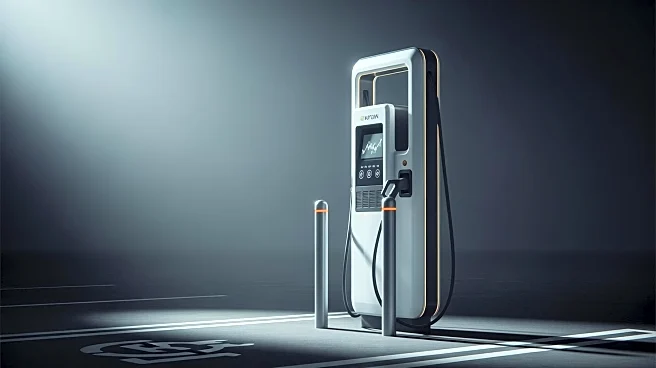What's Happening?
Rivian Automotive Inc. has experienced significant stock volatility, with shares closing at approximately $13.57 on October 2, 2025, marking a 7.1% decline from the previous day. This fluctuation is attributed
to the company's adjusted delivery guidance and broader market challenges, including the expiration of the U.S. $7,500 EV tax credit for leases and high tariffs on imported components. Despite these hurdles, Rivian has made strategic moves, such as forming a joint venture with Volkswagen worth up to $5.8 billion to develop next-generation EV technology. The company also collaborates with Amazon and HelloFresh on commercial electric delivery vans, and is advancing its R2 crossover platform, with production slated to begin in 2028 at a new $1 billion plant in Georgia.
Why It's Important?
The developments at Rivian are crucial for the EV industry, as they highlight the impact of regulatory changes and market dynamics on emerging manufacturers. The expiration of the federal tax credit and high tariffs could dampen consumer demand and increase production costs, posing challenges for Rivian and its competitors. However, Rivian's strategic partnerships and product development initiatives, such as the Volkswagen alliance and the Georgia plant, offer potential growth avenues. These moves could help Rivian scale production, reduce costs, and expand its market presence, although the company must navigate financial pressures and competitive threats from established players like Tesla, Ford, and GM.
What's Next?
Rivian is expected to release its Q3 financial results on November 4, 2025, which will provide further insights into its performance and future outlook. Analysts will closely monitor the company's ability to manage production costs, scale operations, and leverage strategic partnerships to offset market headwinds. The success of Rivian's R2 platform and its integration with Volkswagen's global supply chain will be pivotal in determining its competitive position. Additionally, Rivian's efforts to localize components and manage tariffs will be critical in maintaining profitability and investor confidence.
Beyond the Headlines
Rivian's situation underscores broader industry challenges, including the need for automakers to adapt to changing regulatory environments and consumer preferences. The company's focus on adventure-oriented vehicles and commercial partnerships reflects a strategic attempt to differentiate itself in a crowded market. As Rivian navigates these complexities, its ability to innovate and execute effectively will be key to sustaining growth and achieving long-term success in the evolving EV landscape.










